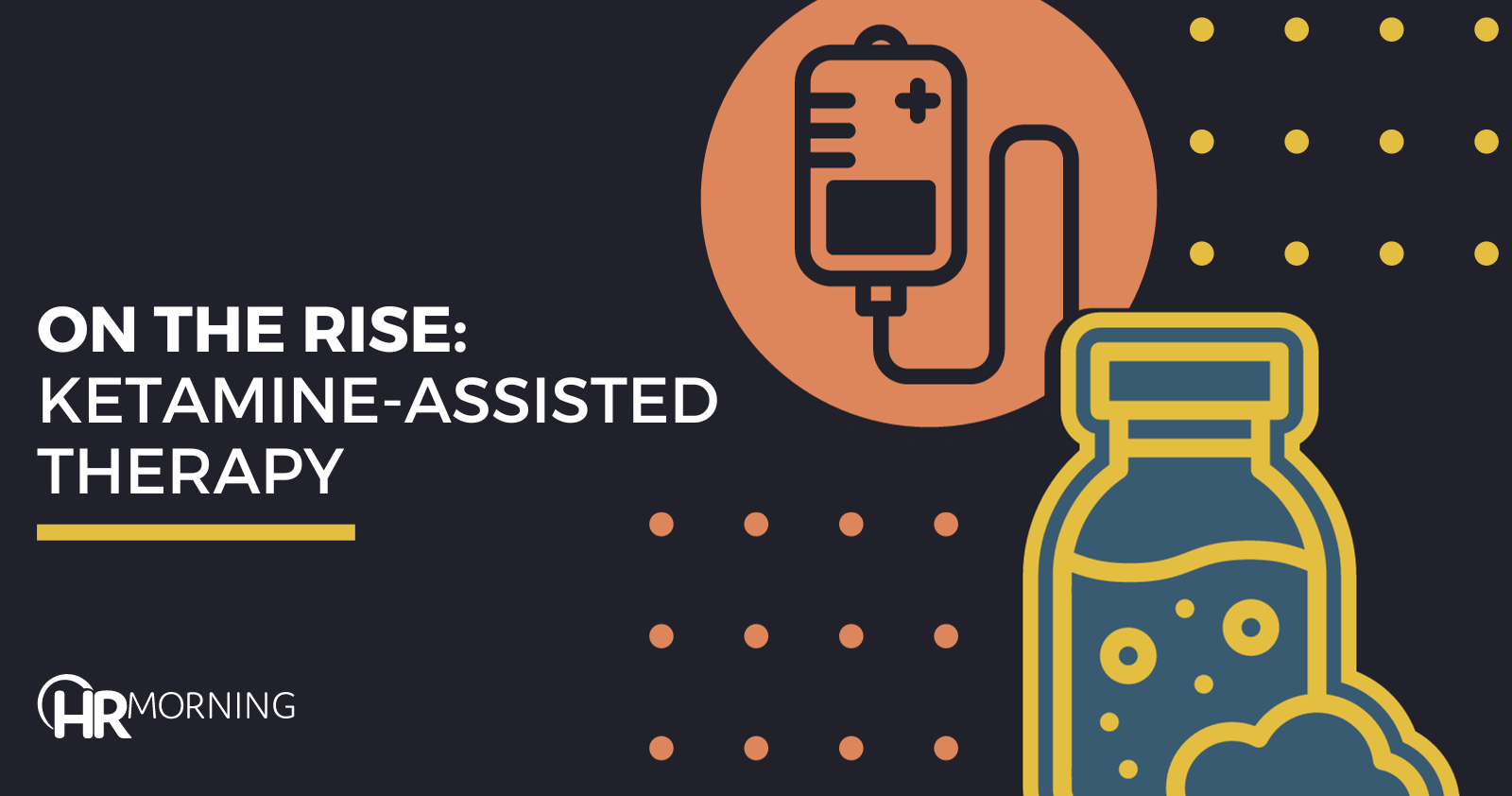There’s an emerging mental health treatment on the rise that HR needs to keep on their radar: Ketamine-assisted therapy. If you think psychedelic mental health treatment sounds like a faraway idea, think again: It’s already happening. And it’s going to impact the workplace.
Alternative psychedelic treatment methods have been gaining steam recently, prompting discussions about its implications for the workplace.
In a world where one in five Americans have a mental health condition and 16.5% are taking psychiatric medication – many of which have less-than-ideal success rates – many are eager for alternative treatment options.
Here’s everything you need to know about ketamine-assisted therapy and its implications for the workplace.
Ketamine-assisted therapy: The basics
Ketamine therapy is “a treatment approach that uses low doses of ketamine, a dissociative anesthetic medication, to manage various mental health conditions, such as treatment-resistant depression, anxiety disorders, and post-traumatic stress disorder,” according to the Pacific Neuroscience Institute.
It works by blocking activity in a brain receptor responsible for mood, cognition and pain perception.
There is also ketamine-assisted psychotherapy (KAP), which integrates “a licensed and highly trained counselor [who] holds space for the client and assists in navigating intention, mindset, setting and integration of each experience,” says Peter Loeb, CEO and co-founder of online substance abuse counseling platform Lionrock Recovery.
“KAP has been shown to treat treatment-resistant depression, an increasing phenomenon. Many studies show that people are able to improve their quality of life much faster than they would be able to in traditional therapy,” says Loeb.
A real-life scenario of ketamine-assisted therapy
Although ketamine therapy is new, at least one company has incorporated it into its benefits plan – with impressive results.
After the founder discovered success with ketamine therapy himself in 2021, popular soap company Dr. Bronner’s began offering ketamine-assisted therapy benefits to its employees, through a partnership with insurance provider Enthea. Their expanded benefit not only helped employees find ketamine-assisted therapy providers but also covered the treatment costs.
Out of 320 employees, about 7% accessed the therapy, according to Enthea, and the results speak for themselves.
Anonymous surveys found that employees showed:
- An 86% improvement in PTSD
- A 67% reduction in major depressive disorder symptoms, and
- A 65% decline in generalized anxiety disorder symptoms.
“While not everyone experiences such deep healing, many of our team members have reported dramatic improvements in their lives as a result of ketamine-assisted therapy,” David Bronner, CEO of Dr. Bronner’s, said in a press release. “We hope to inspire other companies and organizations to also partner with Enthea and offer this benefit to their staff.”
Workplace implications
So far, Dr. Bronner’s is one of the only companies providing ketamine-assisted therapy as a workplace benefit, but Enthea is expanding coverage nationwide.
Under Enthea’s plan, the companies would pick up the tab for employees looking for alternative mental health treatments including ketamine therapy and other psychedelic treatments.
Although it’s still a relatively new offering, employers need to start preparing for how ketamine-assisted therapy and other psychedelic therapies may impact the workplace.
Here are three things to consider about ketamine therapy in the workplace:
- Use at work: “Employers may want to avoid allowing ketamine in the workplace and instead allow additional mental health [or] PTO days to support their employees’ KAP experiences, taking in mind that typically a KAP protocol is around 6 sessions, though this depends on the [employee].”
- Culture alignment: “Employers will also want to take into consideration their culture and if KAP, a form of psychedelic-assisted psychotherapy, aligns with their mission and values in employee care,” says Loeb. “Be ready for push-back, too! Not everyone is supportive of the renaissance of psychedelic medicine, and not everyone will be medically cleared to experience KAP.”
- Informed decision-making: “[Consider] offering education on KAP with a trained and trauma-informed therapist versus ketamine therapy at a drip clinic so that employees can make an informed decision about what options they have is also encouraged,” says Loeb.
“An employee is, basically, able to receive an intensive therapy without having to take many consecutive days off of work,” says Loeb. “If the treatment reduces symptoms greatly, there are likely to be many fewer medical claims over the course of that year, at minimum. Additionally, this is a great way for employers to stand out in their commitment to mental health and to attract high-value talent.”


